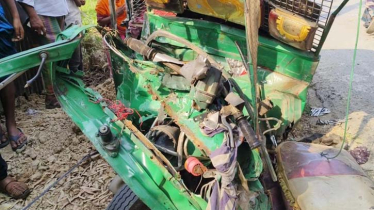
Photo : Messenger
Favorable weather and fertile soil in Phulbari upazila of Kurigram have led farmers to cultivate the juicy Philippines varieties of sugarcane on a commercial basis.
According to the Agriculture Office, the soil in this area is very suitable for sugarcane cultivation, resulting in bumper production.
A young and successful agriculture entrepreneur named Jinnur Rahman was the first to cultivate the black variety sugarcane of the Philippines in Phulbari upazila in Kurigram on a commercial basis. He cultivated this black variety sugarcane on his 25-decimal land and achieved success, attracting the attention of other cultivators who were eager to cultivate similar sugarcane and sought his guidance.
Jinnur Rahman, the son of Momtajur Rahman from the village of Fakirtari in Shimulbari union of Phulbari upazila in Kurigram district, mentioned that the black variety sugarcane from the Philippines is not only juicy and tasty but also profitable. This has sparked the interest of local farmers in cultivating the Philippines variety of sugarcane on a large scale. The sugarcane is of substantial size, tied with bamboo to prevent breakage or damage.
Jinnur Rahman, in addition to being a sugarcane trader, also cultivates poison-free vegetables and other crops. He received one day of training in Dhaka from agriculturist Rahman Ali in 2021. At the end of the training, he purchased 20 black-variety sugarcane plants from Jhenidah and cultivated them on his land.
Although he couldn't sell the black variety sugarcane from the Philippines, he was able to sell the saplings for Tk 7000. The sugarcane trees have a distinctive black appearance and are well-regarded by locals. The Philippines varieties of sugarcane trees are 12-15 feet long, larger than the local variety. These sugarcane varieties are softer, juicier, sweeter, and more profitable to cultivate. The farming practices include the application of 10 kgs of cow dung, 10 kgs of cow urine, 1 kg of Nali (a local sweet), and 1 kg of besom.
Momtajur Rahman, Jinnur's father, expressed his initial skepticism about his son's venture but noted that Jinnur succeeded in his first attempt, surprising the locals. He attributed the success to the grace of Almighty Allah.
Jinnur hopes to earn Tk 1.5 lakh by selling saplings in the next year, and he plans to expand his cultivation.
Phulbari upazila Agriculture Officer Nilufa Yasmin commended Jinnur's efforts, stating that he was the first to cultivate poison-free black variety sugarcane from the Philippines in the upazila. She also mentioned that the agriculture department would provide assistance to any farmer interested in cultivating such sugarcane. In the current year, sugarcane has been cultivated on three hectares of land, including Jinnur Rahman's sugarcane farming in Phulbari upazila.
Messenger/Rabbani/Sun Yath








